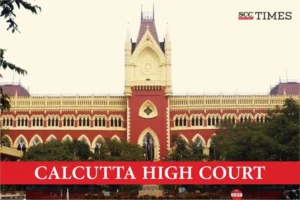Calcutta High Court: In a bail application filed by the petitioner accused of committing offences under the Narcotic Drugs and Psychotropic Substances Act, 1985 (‘NDPS Act’) based on the fact that non-filing of the FSL Report within 180 days made the charge sheet invalid, a Division Bench of Arijit Banerjee* and Apurba Sinha Ray, JJ. granted bail to the petitioner and held that upon expiry of 180 days, the petitioner became entitled to statutory bail/default bail.
Background
The petitioner, in the present matter, was charged with offences punishable under Sections 21-C/25/27-A/29 of the NDPS Act. He was arrested on 31-01-2024 and contended that he became entitled to statutory bail on the 181st day as the charge sheet that had been submitted on the 177th day without the FSL report, was an invalid charge sheet.
It was mentioned that the FSL report had not been submitted by way of a supplementary charge sheet or otherwise within 180 days. The petitioner had applied for default bail on the 183rd day, but the prayer was rejected by the Trial Court. Hence, the present application was filed.
Analysis and Decision
The Court perused Section 36-A(4) of the NDPS Act as well as Sections 167(1) and (2)1 of the Code of Criminal Procedure, 1973 (‘CrPC’) and said that Section 167 prescribes the maximum period for which an accused person can be remanded in judicial custody without filing a charge sheet. It was also said that Section 36-A(4) of the NDPS Act provided that reference to ‘90 days’ as mentioned in Section 167(2) CrPC shall be construed as ‘180 days’ for NDPS cases.
However, the Court said, that if investigation cannot be completed within the said period of 180 days, the Special Court may grant further time up to one year if the report of the public prosecutor indicates progress of the investigation along with reasons for detaining the accused beyond 180 days.
Therefore, the Court said that in an NDPS case, if the charge sheet is filed within 180 days from the date of arrest, a right of statutory bail does not accrue in favour of the accused.
The Court said that there was divergence of opinion on the issue of whether a charge sheet would satisfy the requirements of Section 36A (4) if it is not accompanied by the FSL report. Various judgments regarding this issue were perused by the Court.
The Court stated the undisputed fact that although the charge sheet had been filed within 180 days, the same was not accompanied by the FSL report and the said report was filed as part of a supplementary charge sheet after 180 days from the date of arrest of the petitioner.
Thus, the Court held that upon expiry of 180 days, the petitioner became entitled to statutory bail/default bail, and the Trial Court erred in not extending that privilege to the petitioner.
Accordingly, the petitioner was directed to be released on bail upon furnishing a bond of Rs. 25,000/- with two sureties of similar amount. The conditions for the bail were that the petitioner should appear before the Trial Court on every date of substantive hearing subject to provisions of Section 3172, CrPC and should not intimidate the witnesses or tamper with evidence in any manner whatsoever. Other conditions imposed were that the petitioner shall not leave the jurisdiction of Kaliachak Police Station, Malda and that he must deposit his passport with the Trial Court before his release from the correctional home.
The Court, while disposing of the application, said that if the petitioner failed to adhere to any of the conditions without a justifiable cause, the Trial Court would be at liberty to cancel his bail without further reference to the Court.
[In the matter of: Idul Mia, 2024 SCC OnLine Cal 9109, Decided on 08-10-2024]
*Judgment by Justice Arijit Banerjee
Buy Code of Criminal Procedure, 1973 HERE
1. Section 187 of the Bharatiya Nagarik Suraksha Sanhita, 2023
2. Section 355 of the Bharatiya Nagarik Suraksha Sanhita, 2023

